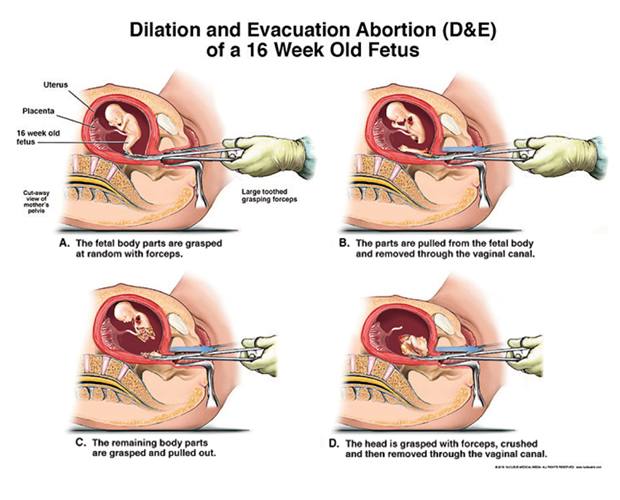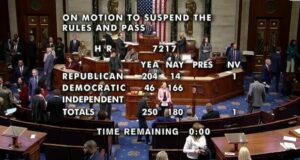The verdict the Kansas Supreme Court was going to render was as tardy as it was predictable. (The decision was held for two years, until after the Kansas governorship election.) On a 6-1 vote, the state’s highest court today shot down the Kansas Unborn Child Protection from Dismemberment Abortion Act and in the process found in various penumbras and emanations in the state Constitution’s Bill of Rights a “right” to abortion.
Although you’d never know it from the majority opinion, the law, S.B. 95, prohibits abortions in which a fully-formed unborn child is torn apart with sharp metal tools, bit by bit, while still alive, inside her mother.
Way back on March 17, 2017, over two years ago, John Hanna of the Associated Press aptly described the court’s reaction during oral arguments.
Kansas’ highest court appeared receptive Thursday to declaring for the first time that the state constitution recognizes abortion rights, with a majority of the justices skeptical of the state’s argument against the idea as it defended a ban on a common second-trimester procedure.
The state Supreme Court heard arguments in a lawsuit filed by Kansas City-area father-daughter physicians against a 2015 first-in-the-nation law that has become a model for abortion opponents in other states. The key issue is whether the Kansas Constitution protects abortion rights independently of the U.S. Constitution, which would allow state courts to invalidate restrictions that have been upheld by the federal courts.
As we wrote at the time,
Indeed, the questions from the majority of Kansas Supreme Court Justices hearing oral arguments in the most important pro-life case in Kansas history, seemed focused on how—not whether– an abortion right will be framed to support a lower court injunction on dismemberment abortions.
Only one Justice, Caleb Stegall, repeatedly probed the problems of the Court “discovering” new abortion protection that, in effect, gives constitutional rights to some groups and not others (the unborn).
Having established a “right” to abortion, the decision likely puts any and all protective laws in peril. In response, Kansans for Life vowed that its “statewide network of grassroots activists will work strategically to amend the Kansas Constitution and ensure that duly enacted pro-life laws remain in place.”
A friend of mine captured the lecturing, hectoring tone of the decision perfectly: “When a state Supreme Court – in essence – criticizes the U.S. Supreme Court as not being pro-abortion enough, things have turned really, really bad.”
Justice Stegall shreds the majority’s shoddy reasoning, its misuse of Kansas history in which the drafters and ratifiers of the state constitution are demonized, the confusion over what standard of review the court should use in addressing the dismemberment law, and the pathetic eagerness (pardon the old idiom) to “get with the times.”
In a word, whatever the people who put the state Constitution together and lived under for the first few decades of the new state of Kansas may have thought, it must be ‘give[n] . . . little weight’ and is ‘wholly unpersuasive’ when it comes to the majority’s enlightened 21st century constitutional interpretation.”
Please bear with me as I offer a number of long excerpts; they are important. Justice Stegall begins
This case is not only about abortion policy—the most divisive social issue of our day—it is more elementally about the structure of our republican form of government. Which is to say, this case is about the proper conditions for just rule. At bottom, this case is about finding and drawing the sometimes elusive line between law and arbitrary exercises of power.
Here we venture onto a battlefield as old as politics itself. And as we argue about the structure of government—and ultimately delineate the proper conditions for just rule—we must never forget that we are also actively engaged in ruling.
The structural idea that gave birth to Kansas as a political community, which has achieved consensus support across most of our history, is that the proper conditions for just rule are met via participatory consent to secure and promote the common welfare. Today, a majority of this court dramatically departs from this consensus. …Today we issue the most significant and far-reaching decision this court has ever made. …
Reading today’s majority opinion is a follow-the-white-rabbit experience. One is left feeling like Alice, invited by the Queen to believe “‘as many as six impossible things before breakfast.’” …Indeed, the story told by the majority is a strange one. In it, all the luminaries of the western legal tradition— from Sir Edward Coke and William Blackstone to Edmund Burke and Thomas Jefferson—would celebrate and enshrine a right to nearly unfettered abortion access. In this imagined world, the Liberty Bell rings every time a baby in utero loses her arm.
The majority’s framing of the issue before us solely as a battleground in a war on women is a ruse. Abortion restrictions are not relics of a patriarchal society—they are a longstanding feature of Kansas law. A ban on dismembering a living human being in utero is not inherently sexist and discriminatory. There are women on both sides of this debate—one that involves complex considerations about the nature of life itself; the contours of a just and fair society; and competing interests, each of which may have a legitimate claim on society’s attention.
I could easily repost half the dissent but you get the point. The majority sees the legislators attempting to stop the dismemberment of huge, living unborn babies as the advance guard of a patriarchy pining to reduce women to obedient breeders.
The majority opinion has so little to do with law, real people, or the history of the Kansas Constitution, it makes you wonder what the majority might have concluded had they not been so determined to teach their inferiors—the people of Kansas—a lesson in humiliation.
–Dave Andrusko, National Right to Life News Editor
Jerrold Nadler: another socialist in Congress
 Metro Voice News Celebrating Faith, Family & Community
Metro Voice News Celebrating Faith, Family & Community 







